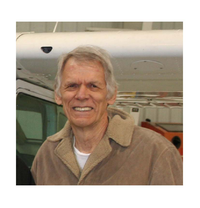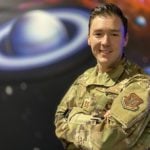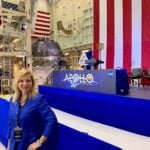Spotlight
Tennessee Teacher Wins Shepard Award
Written by: developer
 Allen V. Robnett, a science teacher at Gallatin High School in Gallatin, Tenn., is the 2010 recipient of the Alan Shepard Technology in Education Award, which is given each year by the Astronauts Memorial Foundation (AMF), the National Aeronautics and Space Administration (NASA), and the Space Foundation in recognition of outstanding contributions to technology education by K-12 educators or district-level education personnel.
Allen V. Robnett, a science teacher at Gallatin High School in Gallatin, Tenn., is the 2010 recipient of the Alan Shepard Technology in Education Award, which is given each year by the Astronauts Memorial Foundation (AMF), the National Aeronautics and Space Administration (NASA), and the Space Foundation in recognition of outstanding contributions to technology education by K-12 educators or district-level education personnel.
The Space Foundation, MF, and NASA will present the award, which is named after Mercury Astronaut Alan Shepard, on April 12 at the Opening Ceremony, sponosred by Northrop Grumman, at the 26th National Space Symposium at The Broadmoor Hotel in Colorado Springs, Colo.
Robnett was selected for his work developing two innovative high-school-level courses that use compelling subjects and hands-on experiences to motivate students to build their science, math, and technology skills.
About the Classes
Robnett's Astronomy and Space Exploration class, which features an in-school planetarium and a rooftop observatory, was launched in 2006. His Aviation Theory and Practice class, which provides actual textbook and simulator pilot training, was launched in 2008.
"The programs use teenagers' fascination with flying and astronomy as 'hooks' to interest them in science while simultaneously introducing them to the application of technology, science, and mathematics to questions that interest them," said Robnett.
The astronomy class uses activities as diverse as calculating the mass of distant stars, participating in star parties with the local astronomy club, and gazing at the heavens through a telescope housed in a domed rooftop observatory. Students in the aviation class progress through all the material necessary to pass the FAA private pilot written exam as well as using classroom-based flight simulators to get the feel of flying a real airplane. Classroom exercises use these highly focused activities to illustrate math and science principles that can be applied across a broad spectrum of practical and theoretical topics.
Robnett began the development process by attending classes and workshops. He then developed the curriculum, obtained approval to launch the classes, and procured grants and in-kind donations to build classroom tools, including flight simulators, a planetarium, and the observatory. He teaches the courses and coordinates community and outside support, such as the NASA Planetarium on Wheels that visits the school each semester. Working with the nearby Sumner Regional Airport, he is even able to offer superior students free flight lessons.
"The principal goal was to foster interest in science, rather than to produce astronomers and aviators," said Robnett. "The students appear to enjoy learning in the two classes, possibly influenced by the fact that I thoroughly enjoy it myself."
About 80 of Gallatin High School's 1,375 students participate in the classes each year. Gallatin is located about 25 miles northeast of Nashville.
About the Award
Alan Shepard, one of the nation's original seven Mercury astronauts, was the first American to fly in space, one of only 12 humans who have walked on the moon, and a former AMF board member. The award named after him recognizes excellence, quality, and innovation in the development and application of technology in the classroom or to the professional development of teachers. This year's judges included two astronauts, representatives from NASA, the AMF and the Space Foundation, and Alan Shepard's daughter.
For more information about the award, click here.
This article is part of Space Watch: March 2010 (Volume: 9, Issue: 3).


